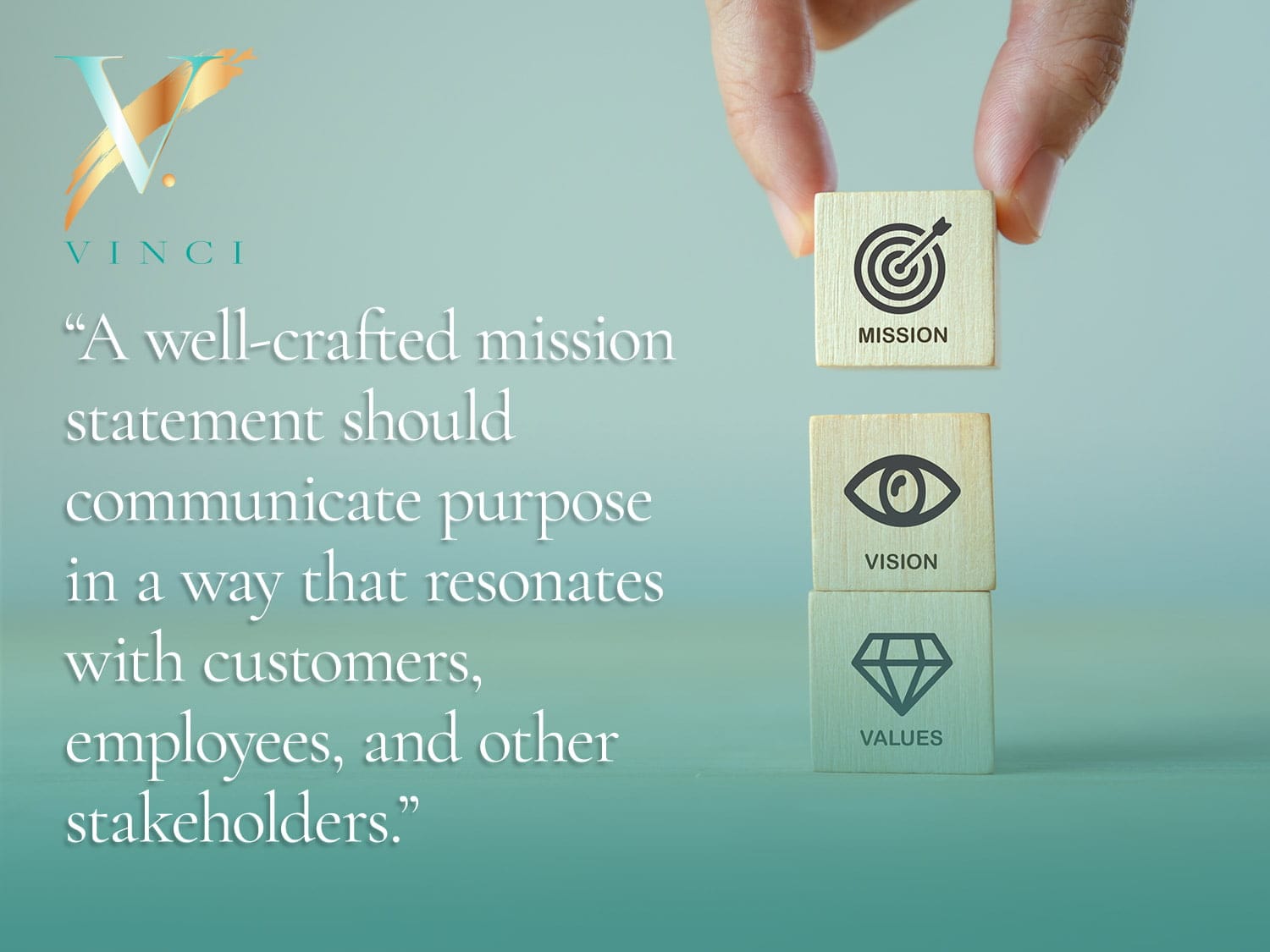As a business owner or entrepreneur, you have probably heard the importance of having a purpose or mission for your company. However, what you may not have considered is the importance of sharing that purpose or mission with your customers.
In today’s society, consumers are becoming increasingly concerned with the values and beliefs of the companies they support. They want to know that the businesses they choose to patronize align with their values and beliefs. By sharing your mission with your customers, you can establish a deeper connection with them and build a loyal customer base.
What Is A Business’s Mission Statement, And Why Do They Need It?

A business mission statement is a brief statement communicating the primary reason for a company’s existence. It is a concise summary of the company’s values, beliefs, and goals, and it serves as a guiding principle for the company’s operations.
The mission statement typically includes the following elements:
- The company’s core values and beliefs
- The company’s primary products or services
- The company’s target audience or customer base
- The company’s unique selling proposition or competitive advantage
- The company’s goals and objectives
A well-crafted mission statement should be clear, concise, and understandable. It should communicate the company’s purpose in a way that resonates with customers, employees, and other stakeholders.
A clearly defined mission statement is important because it provides a framework for decision-making. It also serves as a rallying cry for employees and can help build a strong corporate culture based on shared values and beliefs.
Examples of well-known purpose or mission statements include:
- Google: “To organize the world’s information and make it universally accessible and useful.”
- Nike: “To bring inspiration and innovation to every athlete* in the world. (*If you have a body, you are an athlete.)”
- Patagonia: “Build the best product, cause no unnecessary harm, use business to inspire and implement solutions to the environmental crisis.”
- Apple: “To bring the best personal computing experience to students, educators, creative professionals, and consumers worldwide through its innovative hardware, software, and Internet offerings.”
So Why Should Your Business Share Your Mission With Others?

Sharing your mission with your customers can be incredibly valuable for your business.
Here are some reasons why you should be sharing your mission:
- It Differentiates Your Business From Competitors – In a world where there are so many businesses competing for customers’ attention, it can be challenging to stand out. Sharing your purpose or mission sets your business apart from competitors by demonstrating that you have a unique set of values and beliefs that guide your operations.By sharing your mission with customers, you can showcase how your business differs from others in the market. For example, if your business is committed to sustainable practices, you can highlight that commitment to attract customers who prioritize environmental sustainability.
- It Builds Trust and Credibility – Sharing your mission with customers can also help build trust and credibility. When you communicate openly and honestly about your company’s values and beliefs, customers are likelier to trust that you have their best interests at heart.Additionally, sharing your mission can help establish your business as an authority in your industry. Customers are more likely to trust and respect a business that demonstrates a deep understanding of its purpose and how it fits into the broader market.
- It Creates a Sense of Community – When you share your mission with customers, you create a sense of community around your business. Customers who share similar values and beliefs will be drawn to your business and may even become advocates for it.For example, if your business is committed to supporting local farmers, you may attract customers who prioritize supporting local businesses. These customers may share their positive experiences with others in their community, helping to spread the word about your business.
- It Can Increase Sales and Revenue – Sharing your purpose or mission can also have a positive impact on your bottom line. Customers are more likely to buy from businesses they believe in and support.Additionally, customers who feel connected to your business are more likely to make repeat purchases and recommend your business to others. By building a loyal customer base through sharing your purpose or mission, you can increase sales and revenue over time.
- It Helps You Attract and Retain Talent – Finally, sharing your purpose or mission with customers can also help you attract and retain top talent. Employees are more likely to be committed to a business with a clear sense of purpose and values.Employees who share similar values and beliefs as your business are more likely to be engaged and productive. By sharing your purpose or mission, you can attract employees who are a good fit for your business and retain them over the long term.
Examples of Purpose-Driven Companies
Many purpose-driven companies prioritize social and environmental impact as part of their business model and share their mission with their audience at every turn. Many of these organizations are known as B Corp Companies, simply a group of purpose-driven companies prioritizing social and environmental impact as part of their business model.
Here are some examples of purpose-driven companies:
- Patagonia – Patagonia is an outdoor apparel company committed to sustainability and environmental protection. They donate 1% of their sales to environmental causes and have taken various steps to reduce their environmental impact.
- Warby Parker – Warby Parker is an eyewear company committed to making high-quality, affordable eyewear while giving back to needy communities. They donate some of their profits to organizations that provide eyeglasses to people in developing countries.
- TOMS – TOMS is a footwear and accessory company with a one-for-one business model. For every product purchased, they donate a product to someone in need. They have donated millions of pairs of shoes to children in need worldwide.
- Ben & Jerry’s – Ben & Jerry’s is an ice cream company committed to social and environmental justice. They use fair trade ingredients and have taken various steps to reduce their environmental impact. They also support various social causes, such as marriage equality and climate justice.
- The Honest Company – The Honest Company is a consumer goods company that prioritizes natural and eco-friendly products. They also prioritize transparency and ethics in their business practices, including donating some of their profits to various social and environmental causes.
- Etsy – Etsy is an online marketplace that connects independent creators with buyers who are seeking unique, handmade, and vintage goods. They prioritize sustainability and social responsibility by supporting small businesses, using eco-friendly packaging, and donating some of their revenue to nonprofit organizations.
- Seventh Generation – Seventh Generation is a consumer goods company that produces household cleaning and personal care products that are environmentally responsible and safe for human health. They prioritize transparency and sustainability, using natural and plant-based ingredients, and minimizing their environmental impact.
- The Body Shop – The Body Shop is a cosmetics and skincare company committed to ethical and sustainable business practices. They use natural and fair-trade ingredients, and they do not test their products on animals. They also support various social causes, such as women’s rights and environmental conservation.
- New Belgium Brewing – New Belgium Brewing is a craft beer company prioritizing environmental sustainability and social responsibility. They have implemented various sustainable practices such as using renewable energy, reducing their waste and supporting bike commuting. They also donate a portion of their profits to nonprofit organizations.
- War Child – War Child is a nonprofit organization that supports and protects children in war-torn regions worldwide. They partner with businesses to develop social impact initiatives and provide funding for their programs. For example, they have partnered with the Royal Bank of Canada to provide education and mental health services to children affected by war.
These are just a few examples of purpose-driven companies prioritizing social and environmental impact as part of their business model. These companies demonstrate that it is possible to be successful while also making a positive impact on the world.
Why do Customers Today Care so Much About a Company’s Mission and Purpose?

Customers today care so much about a company’s mission and purpose because they want to support companies that share their values. They want to feel good about their purchases, trust the companies they buy from, and build a connection with the brands they support.
Here are some of the key factors your customers are considering:
- Values – Customers want to feel like they support companies that share their values and beliefs. They want to know that the companies they buy from are committed to making a positive impact on the world and are aligned with their values. By communicating a clear mission and purpose, companies can demonstrate their commitment to shared values and attract customers who prioritize those values.
- Positivity – Customers want to feel good about the purchases they make. They want to know that their purchases are making a positive impact on the world and are not contributing to harm or exploitation. By communicating a clear mission and purpose, companies can provide customers with the assurance that their purchases are making a positive difference.
- Trust – Customers want to trust the companies they buy from. They want to know that the companies are transparent, ethical, and responsible. By communicating a clear mission and purpose, companies can establish trust with their customers by demonstrating their commitment to transparency, ethics, and responsibility.
- Connection – Customers today want to connect with the brands they support. They want to feel like part of a community that shares their values and beliefs. By communicating a clear mission and purpose, companies can create a sense of community around their brand and attract loyal customers who feel deeply connected to the company and its values.
What Happens When a Brand Pretends to be Purpose-Driven but Isn’t?
When a brand pretends to be purpose-driven but is not committed to its stated mission and values, it can have negative consequences. It is critical today for brands to be sincere and authentic in their purpose-driven identity and to live up to their stated mission and values.
When a brand pretends to be purpose-driven but isn’t, it can have several negative consequences:
- Loss of Trust and Credibility – When a brand claims to be purpose-driven but is not committed to its stated mission and values, it can damage customer trust and credibility. Customers may feel misled or deceived by the brand, leading to a loss of trust and credibility. This can ultimately lead to a loss of customers and revenue.
- Negative Reputation and Brand Image – If a brand is falsely claiming a purpose-driven identity, it can lead to a negative reputation and brand image. Customers may associate the brand with dishonesty or insincerity, which can be difficult to overcome. This negative association can spread through word-of-mouth, social media, and other channels, leading to a long-term negative impact on the brand’s reputation.
- Legal and Regulatory Issues – False or misleading claims about a brand’s purpose or impact can also lead to legal and regulatory issues. For example, in the United States, the Federal Trade Commission (FTC) has guidelines for green marketing claims, which require companies to be able to substantiate any environmental claims they make. If a brand is found to be making false or misleading claims about its purpose or impact, it could face legal action and penalties.
- Disengaged Employees – If a brand claims to be purpose-driven but is not committed to its stated mission and values, it can also lead to disengaged employees. Employees who care about the brand’s purpose and values may feel disillusioned and disengaged if they feel that the brand is not meeting its stated mission. This can lead to decreased productivity, higher turnover rates and negatively impacting the company’s overall performance.
There have been several recent examples of brands that have been accused of falsely claiming a purpose-driven identity. Here are just a few:
- Volkswagen – Volkswagen was found to have installed software in its diesel cars that allowed them to cheat emissions tests. This violated environmental regulations and contradicted Volkswagen’s commitment to environmental sustainability.
- Pepsi – Pepsi faced backlash for a 2017 ad that showed Kendall Jenner handing a can of Pepsi to a police officer during a protest. Critics argued that the ad trivialized serious social justice issues and falsely claimed that Pepsi could solve these issues with a can of soda.
- Wells Fargo – Wells Fargo was found to have created millions of fake bank accounts without customers’ consent. This contradicted the bank’s commitment to ethical business practices and customer service.
- H&M – H&M faced criticism for a 2018 ad that featured a black child wearing a hoodie with the phrase “coolest monkey in the jungle.” Critics argued that the ad was racially insensitive and contradicted H&M’s commitment to diversity and inclusion.
- Juul – Juul faced criticism for its marketing practices, which were accused of targeting young people with flavored e-cigarettes. This contradicted the company’s claims of being committed to helping adults quit smoking and reducing harm from tobacco products.
How can your business become more purpose-driven
 Here are some ways your business can become more purpose-driven:
Here are some ways your business can become more purpose-driven:
- Identify Your Purpose and Values – The first step in becoming a purpose-driven business is to identify your purpose and values. This involves defining your company’s reason for existing and the values that guide your decision-making. It is important to involve stakeholders such as employees, customers, and partners in this process to ensure that the purpose and values align with all parties’ needs and expectations.
- Incorporate Purpose and Values into Your Business Strategy – Once you have identified your purpose and values, the next step is to incorporate them into your business strategy. This involves aligning your business goals, operations, and resources with your purpose and values. For example, you may need to change your supply chain, product development, or marketing practices to ensure that they align with your purpose and values.
- Measure and Report on Your Impact – To become a purpose-driven business, measuring and reporting on your impact is important. This involves setting measurable goals and tracking progress toward achieving them. It also involves being transparent about your impact and sharing this information with stakeholders such as customers, employees, and partners.
- Engage Your Stakeholders – To become a purpose-driven business, it is important to engage your stakeholders. This involves building strong relationships with your customers, employees, and partners based on shared values and goals. It also involves listening to their feedback and incorporating it into your decision-making.
- Lead by Example – To become a purpose-driven business, it is important to lead by example. This involves demonstrating your commitment to your purpose and values through your actions and decisions. It also involves setting an example for other businesses and inspiring them to become more purpose-driven.
In summary, becoming a purpose-driven business involves identifying your purpose and values, incorporating them into your business strategy, measuring and reporting on your impact, engaging your stakeholders, and leading by example. By prioritizing purpose and values, businesses can positively impact the world while achieving long-term success.
If you want to learn more about building a purpose-driven brand and how to integrate it you’re your external marketing strategy as well as your company culture we can help. Schedule a free consultation call with our team here at Vinci today. We’ll work with you to understand your unique business values and goals and help craft a mission and purpose everyone on your team can rally behind.











